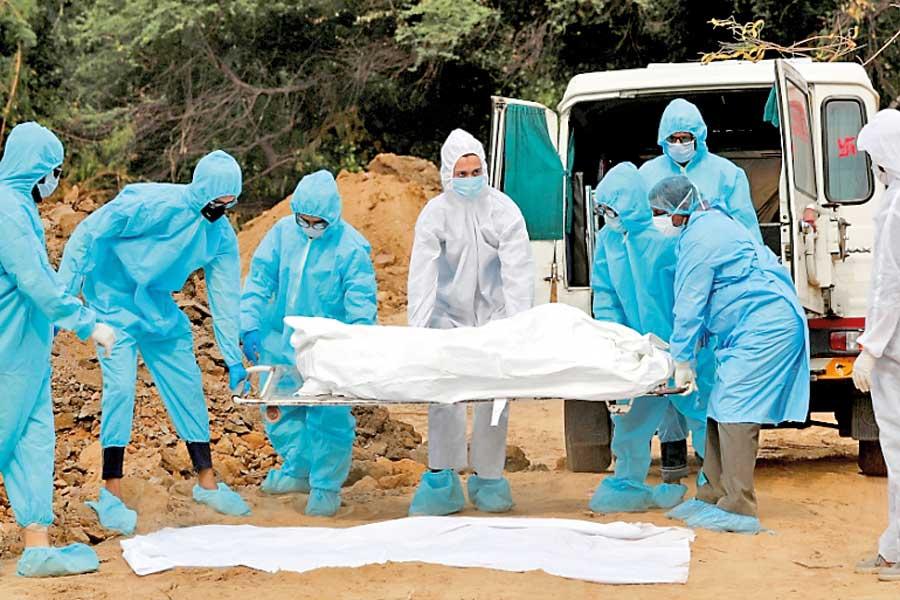Reply To:
Name - Reply Comment
Last Updated : 2024-04-26 02:12:00

Burial or cremation of COVID-19 victims is a WHO recommendation for the disposal of those who die from this disease. This is practiced the world over in more than 190 countries. Sri Lanka prohibits burial on the belief that  burial of COVID-19 victims contaminates ground water. Hitherto, the government scientists have not substantiated scientifically why it is prohibited while the international community and the global scientific authorities have recommended burial of such victims. This is a puzzling question yet to be answered by government scientists.
burial of COVID-19 victims contaminates ground water. Hitherto, the government scientists have not substantiated scientifically why it is prohibited while the international community and the global scientific authorities have recommended burial of such victims. This is a puzzling question yet to be answered by government scientists.
The purpose of this article is to foresee whether burial of COVID-19 victims buried following the internationally accepted practice of burial of victims of the contagion would in reality contaminate the ground water?
Does Infectious Human Cadavers Contaminate Ground Water
"If we consider COVID-19 as similar to VHF, then potentially using double body bags for burial would solve the problem the country is suffering from. This will prevent infection as well as suspected soil or ground water pollution after burial"
Regarding infection hazards of human cadavers, Dr.P.N. Hoffman, MD and Timothy D. Healing, MD in the Guide to Infectious Control in the Health Care Setting (ISID Publication) in chapter titled ’The Infection Hazards of Human Cadavers’ says the following as ‘Known Facts’:
Most of the microorganisms that cause death do not survive for long after the host dies or are not readily transmissible in that context.
Soft tissues remaining on a cadaver could present an infection risk.
Long-buried bodies reduced to skeletons are not a hazard.
A possible hazard in old burials is anthrax, which can form resistant spores but this is unlikely.
In light of the above facts, the belief that burial of COVID-19 victims would contaminate soil/ground water is contestable since such infected cadavers are buried encapsulated in body bags which do not allow body fluids to spill over.
The general burial procedures laid down by World Health Organisation (WHO) for patients who died of viral hemorrhaging fever (VHF) or similar disease is to bury them in double body bags. If we consider COVID-19 as similar to VHF, then potentially using double body bags for burial would solve the problem the country is suffering from. This will prevent infection as well as suspected soil or ground water pollution after burial.
The International Federation of the Red Cross and Red Crescent Societies (ICRC), the International Society for Infectious Disease (ISID) and WHO recommend the use of double body bags for burial management of potentially infectious cadavers. Using body bags are an infection control measure since they are air and water tight containers which prevent ingress of water from outside whilst preventing egress of body fluids from the bag.
Disposal of the deceased
"Using double body bags of this specification ensures that the whole system is absolutely waterproof and effective for seven to 10 years. So that any ‘body fluid’ emanating from the cadaver will settle within the body bag and lose potency over time to infect the soil or ground water"
Advisory Committee on Dangerous Pathogens of Public Health England (2015) in its publication titled, ‘Management of Hazard Group 4 viral haemorrhagic fevers and similar human infectious diseases of high consequence’ in the chapter ‘Disposal of the Deceased’ regarding the protocols of burial management recommends the use of double body bag and a sealed coffin for the disposal of the deceased as in Clause 4 and 6 of the said guidance:
Clause 4. “Where a confirmed VHF case has died whilst being cared for in an isolator, the body should be removed into a sealable plastic body bag (specially designed for use with the isolator) fitted to the port of the bed isolator. The bag should be sealed, separated from the isolator, labelled as high-risk of infection and then placed in a robust coffin, which will need to have sealed joints. It should then be kept, by special prior arrangement with mortuary staff, in a separate and identified cold store unit to await prompt cremation or burial.”
Clause 6. “Where the body of a confirmed or suspected VHF patient is not in an isolator; staff wearing suitable PPE/RPE should place the body in a double body bag. Absorbent material should be placed between each bag, and the bag sealed and disinfected with 1,000 ppm available chlorine or other appropriate disinfectant. The bag should be labelled as high risk of infection and placed in the coffin as described above. An infection control notification sheet should be completed in readiness for the funeral directors.”
Use of Body Bags
Body bags are used for the burial of war, natural disaster and pandemic victims. They are also used for temporary burial when forensic studies are required. It is a standard practice as an emergency response.
Body Bag Specifications by ICRC for Infectious disease
The ICRC gives the following body bag specifications to be used for disposal of infectious disease dead bodies as follows:
Considering the fact that infection hazards of human cadavers have no potency to infect as established by scientific evidence, there is no reason for ground water contamination. The standards established by international bodies like WHO, ICRC, ISID and Public Health England about safe disposal of human cadavers in double body bags is recommended. Adopting the scientifically proven and internationally accepted practice of using body bags for COVID-19 cadavers is a simple solution than holding to an unsubstantiated belief that burial would cause ground water/soil contamination. The failure of the state scientists to guide the people and the government and leave without any scientific substantiation is causing problems more pernicious than COVID-19. This is causing untold human misery and tarnishes the image of the government. Hope knowledge and reason prevails among all stakeholders to solve this rationally.
The writer is a member of the Society of Environmental Engineers, UK and a Chartered Environmentalist having a Master’s Degree in Advanced Environmental & Energy Studies from the United Kingdom.
Asanka Friday, 11 December 2020 12:30 PM
Thank you for this article. Though I am afraid the government and their adepts will not read this, because the truth will not serve them. They don't want this 'problem' solved, because then they can not use it for political gain. Their strategy has nothing to do with healthcare, only racist politics

Add comment
Comments will be edited (grammar, spelling and slang) and authorized at the discretion of Daily Mirror online. The website also has the right not to publish selected comments.
Reply To:
Name - Reply Comment
US authorities are currently reviewing the manifest of every cargo aboard MV
On March 26, a couple arriving from Thailand was arrested with 88 live animal
According to villagers from Naula-Moragolla out of 105 families 80 can afford
Is the situation in Sri Lanka so grim that locals harbour hope that they coul